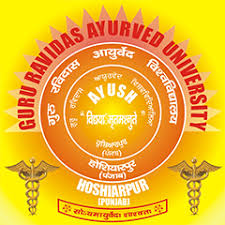Guru Ravidas Ayurved University (GRAU Punjab)

Guru Ravidas Ayurved University (GRAU Punjab): A Complete Overview
Introduction
Guru Ravidas Ayurved University, commonly known as GRAU Punjab, is a leading institution in Punjab, India, dedicated to the advancement of Ayurvedic and health sciences. Established with a vision to promote traditional Indian medicine and integrate it with modern health sciences, GRAU has rapidly grown to become a key player in Ayurvedic education, research, and healthcare training. Located in Hoshiarpur, Punjab, this esteemed university offers a variety of undergraduate, postgraduate, and research programs, nurturing professionals skilled in Ayurveda and allied health sciences.
History and Background
Founded in 2011 under the Guru Ravidas Ayurved University Act, GRAU Punjab was created to fill the need for a dedicated institution in Punjab for Ayurvedic studies and alternative healthcare education. Named after Guru Ravidas, a revered saint and spiritual guide, the university reflects his teachings of universal love, equality, and holistic well-being. GRAU Punjab has since focused on creating well-rounded, skilled professionals capable of contributing to both the ancient science of Ayurveda and modern integrative medicine. Through strategic alliances and rigorous academics, the university emphasizes research, clinical skills, and the rich heritage of Ayurvedic knowledge.
Location and Campus
Guru Ravidas Ayurved University is strategically situated in Hoshiarpur, Punjab, a city known for its cultural richness and vibrant student life. The university campus spans several acres, blending traditional architectural elements with modern infrastructure to create a serene and conducive environment for learning. The campus is equipped with lecture halls, research laboratories, herbal gardens, a central library, hostels, and sports facilities. The central library, an integral part of the university, holds an extensive collection of ancient Ayurvedic manuscripts, contemporary medical journals, and electronic resources, aiding students and researchers in accessing critical knowledge sources.
Courses and Programs Offered
GRAU Punjab offers a range of programs, catering to the diverse interests of students and professionals in Ayurvedic and allied health sciences. Some of the main programs include:
- Bachelor of Ayurvedic Medicine and Surgery (BAMS)
This is a five-and-a-half-year undergraduate program, including a one-year mandatory internship. The curriculum covers classical Ayurvedic texts, diagnostic techniques, pharmacology, and modern clinical practices, training students to become competent Ayurvedic practitioners. - Bachelor of Homoeopathic Medicine and Surgery (BHMS)
Similar to BAMS, this five-and-a-half-year program focuses on the homeopathic system of medicine. It blends theoretical knowledge with hands-on practice, ensuring students are skilled in diagnosis, homeopathic pharmacology, and treatment. - Postgraduate Courses (MD/MS in Ayurveda)
GRAU offers Master’s degrees in Ayurveda across various specialties, such as Kayachikitsa (Internal Medicine), Panchakarma, Shalya Tantra (Surgery), and more. These programs emphasize advanced clinical training, research methodologies, and specialized Ayurvedic treatments, preparing graduates for roles in education, research, and specialized clinical practice. - Diploma and Certificate Courses
To promote Ayurveda at the grassroots level, the university offers diploma and certification courses in fields like Ayurvedic Pharmacy, Panchakarma Therapy, Yoga, and Herbal Medicine. These short-term courses equip students and healthcare professionals with foundational skills for patient care and wellness practices. - Research Programs (Ph.D.)
GRAU Punjab is committed to advancing Ayurvedic research through its Ph.D. programs. Research areas include Ayurvedic pharmacology, medicinal plants, integrative medicine, and Ayurvedic therapeutic practices, fostering a spirit of innovation and scientific inquiry in traditional medicine.
Faculty and Research
Guru Ravidas Ayurved University boasts a highly qualified faculty comprising doctors, researchers, and academicians with expertise in both Ayurveda and modern health sciences. The faculty is dedicated to delivering comprehensive education and mentorship, guiding students toward excellence in their academic and clinical pursuits. Research is a primary focus at GRAU, with faculty and students engaged in research projects that explore Ayurvedic medicinal plants, herbal formulations, clinical outcomes of Panchakarma therapies, and integrative treatments for chronic diseases. Collaborations with Ayurvedic industries and health institutions further enhance the university’s research capabilities, ensuring that findings are practical and impactful.
Herbal Garden and Medicinal Plant Resources
An impressive feature of the GRAU campus is its herbal garden, which is home to hundreds of medicinal plant species used in Ayurvedic treatment. The garden provides a hands-on learning environment for students, where they can study the properties, cultivation, and therapeutic uses of various herbs. The garden supports the BAMS and MD/MS programs by offering fresh plant materials for practical lessons and research. Additionally, the herbal garden supports sustainable plant use practices, contributing to environmental awareness and biodiversity conservation.
Library and Digital Resources
The library at Guru Ravidas Ayurved University is a knowledge hub for students, researchers, and faculty members, offering a wide range of resources on Ayurvedic, homeopathic, and modern medical sciences. Equipped with both physical and digital resources, the library houses ancient Ayurvedic texts, manuscripts, modern medical journals, reference books, and online databases, providing a well-rounded academic support system. Digital facilities allow students to access e-journals, digital archives, and scholarly articles, keeping them updated with recent advances in Ayurvedic and healthcare research worldwide.
Student Life and Activities
The vibrant student life at GRAU Punjab is one of its key attractions. The university encourages students to engage in extracurricular activities, cultural events, seminars, and workshops. The student council organizes various events, including Ayurveda Day celebrations, health camps, and awareness drives promoting traditional medicine. Through these activities, students gain holistic development, fostering communication, leadership, and teamwork skills that complement their academic growth.
The university also conducts health camps and outreach programs, providing free Ayurvedic consultations and treatments to nearby communities. These community services offer students practical experience in patient care, while also fulfilling GRAU’s mission to serve society.
Admission Process and Eligibility
Admission to the programs at Guru Ravidas Ayurved University is based on entrance exams and academic merit. For undergraduate courses like BAMS and BHMS, candidates need to qualify for the National Eligibility cum Entrance Test (NEET). For postgraduate programs, candidates must complete a relevant undergraduate degree and clear entrance exams specific to Ayurvedic postgraduate studies. The admission process is transparent and adheres to government guidelines, ensuring fair opportunities for deserving students.
Affiliated Colleges
Guru Ravidas Ayurved University has an extensive network of affiliated colleges across Punjab, extending the reach of Ayurvedic education and healthcare. These affiliated institutions offer undergraduate and postgraduate programs under the guidance and academic regulations of GRAU, ensuring standardized education and examination processes. The university oversees curriculum development, faculty training, and student evaluations at these colleges, promoting uniformity and quality in Ayurvedic education across the state.
Vision and Mission
The vision of GRAU Punjab is to be a leader in Ayurvedic education, research, and healthcare, contributing to the well-being of individuals and society by integrating traditional wisdom with contemporary scientific knowledge. The university’s mission emphasizes producing competent professionals who can promote Ayurvedic principles, support public health, and contribute to global health solutions through evidence-based Ayurvedic practices. GRAU is also committed to fostering a research-oriented environment where students and faculty can innovate and refine Ayurvedic treatments for modern health challenges.
Future Prospects and Goals
With an increasing interest in holistic and traditional medicine worldwide, GRAU Punjab is poised for growth. The university plans to expand its research capabilities, establish more collaborations with global institutions, and introduce advanced programs in integrative health sciences. Additionally, GRAU aims to launch online courses and distance education programs, making Ayurvedic knowledge accessible to a broader audience. By embracing innovation and evidence-based practices, GRAU Punjab is well-positioned to lead the future of Ayurvedic and holistic healthcare in India and beyond.
Conclusion
Guru Ravidas Ayurved University, Punjab, stands at the forefront of Ayurvedic education, blending traditional wisdom with modern healthcare innovations. With its comprehensive academic offerings, research initiatives, and community-focused programs, GRAU Punjab is a premier destination for students aspiring to become proficient practitioners of Ayurvedic and allied health sciences. The university’s dedication to excellence in teaching, research, and service highlights its commitment to nurturing skilled professionals who will uphold and advance the legacy of Ayurveda
Courses/Programs
| Serial# | Title | Estimated Cost | Program type |
|---|
Campuses
Reviews
Average rating
0.0 / 5
Rating breakdown
Submit your review

- Location
Una Rd, VPO, Kharkan, Hoshiarpur, Punjab 1461101 Click address for directions
- Phone
- Fax
- Web Site